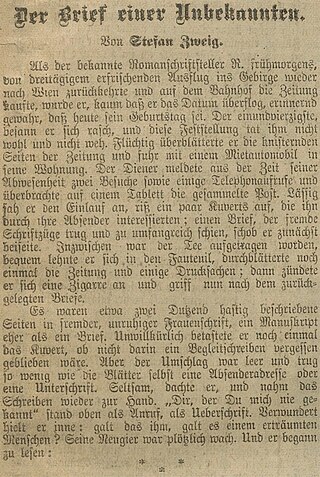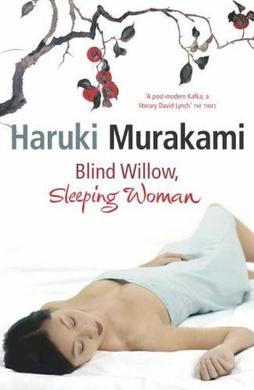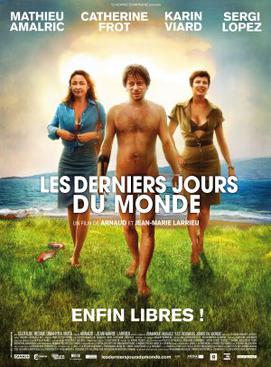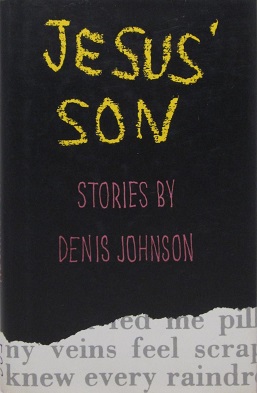Related Research Articles

Letter from an Unknown Woman is a novella by Austrian writer Stefan Zweig. The work first appeared in the 1 January 1922 issue of the Viennese Neuen Freien Presse, before being published in book form as part of the collection Amok: Novellen einer Leidenschaft. The novella tells the story of an author who, while reading a letter written by a woman he does not remember, gets glimpses into her life story. It is generally considered to be Zweig's most famous work of fiction.

Stefan Zweig was an Austrian writer. At the height of his literary career, in the 1920s and 1930s, he was one of the most widely translated and popular writers in the world.

The Royal Game is a novella by the Austrian author Stefan Zweig written in 1941, the year before the author's death by suicide. In some editions, the title is used for a collection that also includes "Amok", "Burning Secret", "Fear", and "Letter From an Unknown Woman".
Strange Pilgrims is a collection of twelve loosely related short stories by the Nobel Prize–winning Colombian writer Gabriel García Márquez.

White Nights is a 1957 romantic drama film directed by Luchino Visconti, based on Fyodor Dostoevsky’s 1848 short story of the same name. It was written for the screen by Visconti and Suso Cecchi d'Amico, and stars Maria Schell, Marcello Mastroianni, and Jean Marais. The film received positive reviews from critics and audiences, and won the Silver Lion at the 18th Venice International Film Festival.

Die schweigsame Frau, Op. 80, is a 1935 comic opera in three acts by Richard Strauss to a libretto by Stefan Zweig after Ben Jonson's 1609 comedy Epicœne, or The Silent Woman.

Ashes and Diamonds is a 1948 novel by the Polish writer Jerzy Andrzejewski. The story takes place during the last few days of World War II in Europe, and describes the political and moral dilemmas associated with the soon to be suppressed Anti-communist resistance in Poland (1944–1946). The protagonist Maciek is a soldier in the underground anti-communist Polish army assigned to kill the Communist Szczuka. The story follows Maciek's and other characters' actions in those ominous days.

Édouard Molinaro was a French film director and screenwriter.

Blind Willow, Sleeping Woman is a collection of 24 short stories by Japanese author Haruki Murakami.

The Golden Ball and Other Stories is a short story collection written by Agatha Christie and first published in the US by Dodd, Mead and Company in 1971 in an edition priced at $5.95. It contains fifteen short stories, all of which were originally published from 1925 through 1934.

"The Thing in the Moonlight" is a short story by J. Chapman Miske. The story is based on a letter dated November 24, 1927 from H. P. Lovecraft to Donald Wandrei describing one of Lovecraft's dreams. The story was prepared for publication by Miske, who filled in the story surrounding the description of the dream. In places, the letter and published story are identical to Lovecraft's style. It was first published in Bizarre magazine in January 1941.

Betrachtung is a collection of eighteen short stories by Franz Kafka written between 1904 and 1912. It was Kafka's first published book, printed at the end of 1912 in the Rowohlt Verlag on an initiative by Kurt Wolff.

"Au clair de la lune" is a French folk song of the 18th century. Its composer and lyricist are unknown. Its simple melody is commonly taught to beginners learning an instrument.

Letter from an Unknown Woman is a 1948 American drama romance film released by Universal-International and directed by Max Ophüls. It was based on the 1922 novella of the same name by Stefan Zweig. The film stars Joan Fontaine, Louis Jourdan, Mady Christians, and Marcel Journet (actor).

Import/Export is an Austrian drama film by the director Ulrich Seidl from 2007. It was nominated for the Palme d'Or at the 2007 Cannes Film Festival and won the Grand Prix - Golden Apricot reward at the Yerevan International Film Festival. The film was shot in Vienna, Ukraine, Romania, the Czech Republic, and Slovakia from 2005 until May 2007 on 16mm film. Simultaneously, the film follows a nurse from Ukraine searching for a better life in the West and an unemployed security guard from Austria heading East for the same reason.
"Corey's Coming" is a song written and sung by Harry Chapin. It was released on his 1976 album On the Road to Kingdom Come.

Amok is a novella by the Austrian author Stefan Zweig. First printed in the newspaper Neue Freie Presse in 1922, Amok appeared shortly afterwards in the collection of novellas Amok: Novellas of a Passion. As Zweig was fascinated and influenced by Sigmund Freud's work, Amok includes clear psychoanalytic elements. It deals with an extreme obsession, which leads the protagonist to sacrifice his professional and private life and, eventually, to commit suicide.

Happy End is a 2009 apocalyptic comedy-drama film written and directed by Arnaud and Jean-Marie Larrieu, based on the 1991 novel Les Derniers Jours du monde by Dominique Noguez. The film depicts the story of a man, Robinson, who travels across France and Spain during the end of the world.

Jesus' Son is a collection of short fiction by Denis Johnson published in 1992 by Farrar, Straus & Giroux. A short story cycle comprising 11 pieces, Jesus' Son is Johnson's most critically acclaimed and popular literary effort, and the work with which Johnson is most identified. In 1999, it was adapted into a film of the same name by Elizabeth Cuthrell, David Urrutia, and Oren Moverman, directed by Alison Maclean.

We Are the Night is a 2010 German vampire horror film directed by Dennis Gansel, starring Karoline Herfurth and Nina Hoss. The film deals with a young woman who gets bitten by a female vampire and drawn into her world. She falls in love with a young police officer who investigates a murder case involving the vampires. The film explores themes of depression, self-harm, the consequences of immortality, suicide, and explores Valerie Solanas' idea of an all-female society.
References
- ↑ Stefan Zweig (7 November 2013). The Collected Stories of Stefan Zweig. Pushkin Press. ISBN 978-1-78227-070-6.
- ↑ Haydn, Hiram; Cournos, John (1974). A World of Great Stories. Bounty Books. OCLC 8025839.
- ↑ Howard M. Sachar (29 October 2014). The Assassination of Europe, 1918-1942: A Political History. University of Toronto Press. p. 400. ISBN 978-1-4426-0918-1.
- ↑ La ruelle au clair de lune. Auteur Production Group. OCLC 494237410 – via WorldCat.
- ↑ La ruelle au clair de lune at IMDb